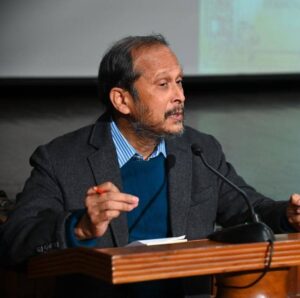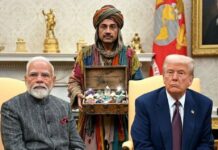— N R Mohanty —
Ankit Panda, one of the biggest names in nuclear policy research, says that the USA is coming to terms with a volatile, nuclear-armed North Korea. If the USA sits out, he is certain, the Indo-Pak conflict will cross the nuclear Rubicon. But our Prime Minister is shooting his mouth off every other day saying that he is not deterred by Pakistan’s nuclear blackmail. Is it a case of fools rushing in where angels fear to tread?
Ankit Panda’s latest book: ‘The New Nuclear Age: At the Precipice of Armageddon’ hit the markets last month around the time Pahalgam happened. That’s why the book has no mention of Operation Sindoor and its aftermath. But the book discusses at some length the Pulwama-Balakot strike of 2019.
As expected, Panda — a Senior Fellow with the Carnegie Endowment for International Peace based at Washington DC and a regular contributor to the New York Times and the New Yorker on nuclear issues — has been, in recent weeks, talking about how South Asia was caught up in a nuclear precipice after Operation Sindoor and Pakistan’s counter-strike earlier this month.
I listened to an interesting podcast discussion last week between Ankit Panda and Vipin Narang, Professor of Nuclear Security at the MIT, on the nuclear conflagration worldwide and in South Asia in particular. Panda spoke extensively about the impending nuclear threats in an interview with the Times of India as well.
Panda argues that the Iranian nuclear threat is a crisis in the making. But North Korea and Pakistan, two full-blown nuclear states, are already on the knife’s edge and can explode anytime. The reasons are simple: in both the countries, there is volatile leadership, often talking about nuclear weapons as if they are toys to play simulated games with.
The Old Nuclear Age was an age of relative stability, Panda argues, as two major nuclear powers, USA and USSR, behaved relatively responsibly, without causing major nuclear flashpoints. America pulled back from the Cuban misadventure at the last moment, despite much embarrassment to itself, because it realised that an attempt to overthrow the Castro regime would amount to crossing the red line of a nuclear signalling.
But in an era of multiple nuclear actors, some quite small, such restraint may not hold. Panda points the finger squarely at North Korea and Pakistan because these two small nuclear-armed countries are facing two larger conventional military force as their immediate enemy: South Korea ( fully backed by the USA) and India. As they have no chance of success in the conventional war, both North Korea and Pakistan keep ratcheting up the nuclear card to defend themselves.
Can these two rogue states be restrained by threat or coercion? Ankit Panda is not sanguine about it. The US kept threatening North Korea but to no avail. Kim Jong Un, the Supreme Leader of North Korea, has been as defiant as ever. Now, with iron-clad alliance with China and Russia — two major nuclear powers, apart from the US — it’s impossible for the USA to think of trying to destabilise the Kim regime without setting in motion a spectre of a nuclear war. Panda’s considered advice: the US must offer an olive branch to Un’s Korea to stabilise the region. Or else, the South Koreans will always be on a powder keg.
Panda thinks that India-Pakistan turbulence is not much dissimilar. The Indian strike on May 7 in the Pakistani territory might not have gone beyond the redline set by Pakistan for the first-use nuclear policy, but the May 10 aerial attack that hit close to the nuclear stockpile of Pakistan clearly raised the hackles of the Pakistan’s military which governs the country through the proxy civilian government.
Vipin Narang, the MIT professor, was quite emphatic that the satellite pictures of that May 10 attack and the consequent moves by the Pakistani authorities alarmed the US, as reported by the New York Times. Vice President Vance and Secretary Rubio were forced to get into the act; they both worked the phones with the top leadership of the two hostile nations. Rubio spoke to General Munir about the dangers of nuclear escalation; Vance apprised PM Modi about the real threat of a nuclear exchange. That intervention calmed the nerves and a ceasefire was agreed to. Narang believes that it was Pakistan’s nuclear capability ( nuclear blackmail, if you like it) persuaded the USA to intercede with India to back off from further aerial attack.
Ankit Panda is quite certain: if the USA sits out the next time, the India-Pakistan conflict will, silly nilly, cross the Nuclear Rubicon.
What is the lesson?
Panda advises the US to come to terms with North Korea to avoid the nuclear overhang in the region. The US is clearly pursuing a cautious stance vis-a-vis North Korea these days.
But our Prime Minister is busy setting alight the nuclear fire by overshooting his mouth day after day through his juvenile bravado that he will not be deterred by the nuclear blackmail of Pakistan.
Is it a case of fools rushing in where angels fear to tread?
Discover more from समता मार्ग
Subscribe to get the latest posts sent to your email.
















